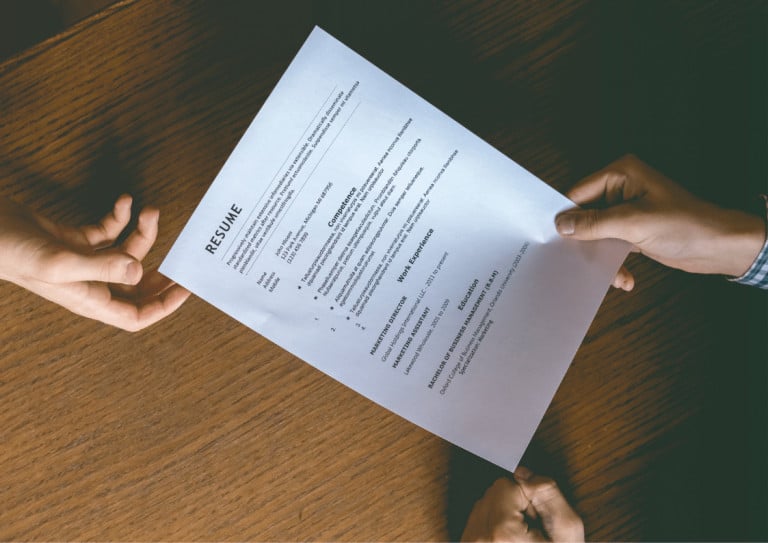Can You Take Notes Into An Interview (And Should You??)
You want to ensure that you bring your A-game to the interview room and not make any errors that could leave potential employers with a poor first impression.
One of the questions over interview etiquette that appears time and again in job seeker forums is to do with whether taking notes into an interview could hurt your chance of being hired.
It is completely acceptable (and even encouraged) for you to bring notes to your job interview if your notes contain possible questions you have of your potential employer. This can signal to the interviewer your willingness to come prepared to work.
However, it is not recommended that you bring notes geared towards answering questions posed to you or if the interview is a behavioral or situational-type interview.
This post will cover the ins and outs of bringing notes with you to an interview, including when it is appropriate, when it is not appropriate to have notes, and tips on other things you should bring with you to an interview.
If once you have your interview prep all in hand, you might be interested in learning more about how to create a strong first impression when first entering an interview room.
When should I bring notes to a job interview?
It goes without saying that properly preparing for an interview by researching the specific position you’re applying for, and the company you are applying to will give you an added advantage. Not only will you feel more confident, but your potential employer will be able to see your eagerness to work.
There are many times however when it is appropriate and even encouraged that potential employees bring notes into a job interview. You may have job-related questions, employment-related questions, or wish to be able to highlight particular skills or related experience that you don’t want to forget to mention.
It is appropriate to bring notes to your job interview when you are:
- asking the interviewer questions
- taking notes during the interview
- providing a copy of your resume
It can also benefit you to bring an extra copy of your resume to share with your potential employer (just in case the interviewer doesn’t have one on hand), to provide talking points and reference material.

Asking the interviewer questions
Being prepared for your job interview comes with a lot more than just dressing the part. Taking time to do your homework on the company you are trying to work for will do more than just instill confidence in you.
Notes that involve prepared questions that you plan to ask the person interviewing you are 100% appropriate to bring with you. You can ask questions regarding the company that you could not determine from your research or questions regarding job duties and responsibilities.
Having prepared questions can indicate to your interviewer the eagerness and motivation you bring to the table and increase your chances of landing the job.
Note-taking during your interview
It can also be wholly acceptable to jot down your own notes during your job interview. Just be sure to ask your interviewer beforehand.
This is another simple way that you can express to your potential employer a willingness and eagerness to learn as much as you can to do the best job possible.
Now that you’ve learned when notes are appropriate for an interview and what those notes should entail, let’s discuss the flipside of that coin.
The importance of an on-hand resume
Having an extra copy or two of your resume will allow you to physically bring attention to specific skills or experiences that you have.
Being able to reference your resume during your interview can also increase your ability to keep your focus on the job-related skills and experiences you should highlight and avoid trailing off into irrelevant information territory.
Make sure your resume is structured and formatted in a way that cuts straight to the ‘need to know’ information that the interviewer will be interested in.

When should you avoid bringing notes to a job interview?
There are certain interview situations when bringing notes with you is not appropriate. Having a list of prepared answers to address interview questions will make you seem robotic, unprepared, and under-researched.
It is also frowned upon to bring notes to a situational or behavioral-type interview, as is using your cellular device as a notepad.
Tip: Don’t fiddle with your cue cards or notes during the interview, and definitely don’t pay them more attention than the interviewer who is assessing your suitability for the role. Keep them hidden from view in a bag or pocket until the time comes when you are invited to ask a question.
Avoid relying on prepared answers
Prepared questions for your interviewer are completely acceptable; on the other hand, prepared answers are not. Being wholly reliant on a list of prepared answers will leave you looking unprepared and completely unprofessional.
Avoid notes when in a situational or behavioral type interviews
Behavioral-type interviews are designed to prompt you to speak about specific, relative experiences. Interviewers want to be able to gauge genuine responses and not answers read from a sheet of paper.
Situational interviews are meant to measure how well you can handle specific job-related situations. Interviewers are looking to see problem-solving and analytical skills. Having notes in a situational-type interview will detract from showcasing your ability to respond appropriately under pressure.
Notes are not appropriate nor encouraged in either of these interview situations.
Other relevant items to bring to an interview (instead of notes)
If you are concerned about the first impression that notes may bring, you can easily bring a few of these items to your interview instead:
- A quality notepad and pen for note-taking (don’t bring your dog-eared spiral and partially-eaten ballpoint pen)
- An updated portfolio containing relevant past work or projects to share with your potential employer
- A complete list of personal and professional references (letters of recommendation can come in handy too!
- An updated, quality business card
Final thoughts
Bringing notes to a job interview is wholly acceptable and often encouraged, except for scenarios where you plan on using them to answer questions – particularly those you should have practiced during preparatory research.
If you do bring notes and intend to take notes during your interview, be sure that you stay engaged and active with those interviewing you.
Remember that preparedness is key to landing the job you want. Bringing notes that contain pertinent questions for your interviewer and an extra copy of your resume can help you stand out amongst the crowd of other potential employees.


